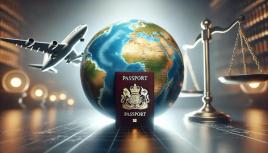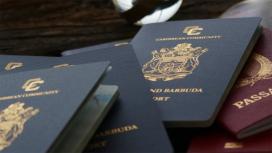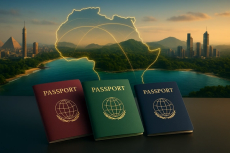Blog • Published on:October 28, 2025 | Updated on:October 28, 2025 • 16 Min
How the CARICOM Free Movement Agreement Is Transforming Caribbean Citizenship
A subtle but impactful transformation is taking place in the Caribbean.
In 2025, the new CARICOM Free Movement Agreement is changing how citizens, including holders of Caribbean second passports, can live, work, and travel across the region.
For investors and families who’ve obtained citizenship through Caribbean CBI programs, this is the next phase of regional unity.
The agreement strengthens mobility, trade, and cooperation between nations that already share culture, values, and now, economic opportunity.
Understanding the CARICOM Agreement
What Is the New CARICOM Free Movement Agreement?
The Caribbean Community (CARICOM) is a regional organization uniting 15 member states and 6 associate members.
In 2025, four member states of the bloc finalized a new framework for unrestricted movement of citizens among participating nations, covering work, residency, and establishment of business activities across borders.
The latest update expands eligibility and simplifies travel for CARICOM nationals from these four countries, aligning the region more closely with the European Union’s model of integrated mobility. This is expected to be rolled out to the rest of the Caribbean Community in due course.
Importantly, citizens from the Caribbean Citizenship by Investment (CBI) nation of Dominica now gain even greater access to the wider Caribbean economy. The expectation is that soon nationls from other CBI countries such as Antigua and Barbuda, Grenada, Saint Kitts and Nevis, and Saint Lucia will be able to join them.
How Has CARICOM Evolved Over Time?
CARICOM was founded in 1973 under the Treaty of Chaguaramas with the vision of creating a single Caribbean market and economy (CSME).
Over the decades, member nations have worked toward harmonizing trade laws, migration policies, and education standards.
The Free Movement of Persons initiative began as a pilot for skilled nationals from four countries and looks likely to evolve into a comprehensive regional agreement, eliminating the need for work permits and enabling citizens to move and reside freely.
This future integration will mark one of the most significant steps toward Caribbean economic and social unity since CARICOM’s formation.
Which Countries Are Part of CARICOM?
Full Members:
Antigua and Barbuda, Bahamas, Barbados, Belize, Dominica, Grenada, Guyana, Haiti, Jamaica, Montserrat, Saint Kitts and Nevis, Saint Lucia, Saint Vincent and the Grenadines, Suriname, and Trinidad and Tobago.
Associate Members:
Anguilla, Bermuda, British Virgin Islands, Cayman Islands, Curaçao, and Turks and Caicos Islands.
Quick Overview:
Statistical Summary (2025)
- Total member states: 15 full + 6 associate
- Combined population: ~16 million
- Regional GDP: ~$130 billion
- CBI’s share of GDP in member nations: 25–40%
- Top CBI programs linked to CARICOM: Saint Kitts and Nevis, Dominica, Grenada, Antigua and Barbuda, and Saint Lucia
Benefits of Free Movement in the Caribbean Region
The new CARICOM four-member agreement is a step towards creating one connected Caribbean economy.
For both native citizens and holders of Caribbean second citizenships, the changes will mean easier mobility, smoother business operations, and stronger regional opportunities.
What Are the Economic Advantages?
The core goal of the new agreement is to strengthen economic collaboration within the Caribbean Single Market and Economy (CSME).
By removing restrictions on movement, professionals, entrepreneurs, and investors can now:
- Work or establish businesses freely in any member state
- Benefit from tax cooperation and simplified cross-border trade
- Hire regional talent without work permit barriers
- Participate in intra-regional real estate and tourism ventures
How Does It Encourage Social Integration?
The free movement agreement is as much about identity as it is about policy.
It promotes Caribbean unity, encouraging cultural exchange, education, and shared growth between islands that were once separated by administrative barriers.
Students and families can now relocate for education, employment, or quality of life without starting from scratch.
Healthcare access, professional recognition, and social inclusion are all being standardized across the region, ensuring smoother transitions between member states.
What Are the Business and Employment Benefits?
For entrepreneurs and professionals, this agreement changes everything.
- Regional job markets will welcome citizens from any CARICOM state, including CBI passport holders.
- Business registration will become simpler, with mutual recognition of legal and tax documents.
- Investors will be able to expand operations from one island to another without full reapplication or local restrictions.
This also will mean that a Grenadian or Dominican citizen can legally live in Saint Lucia, open a business in Antigua, and work with partners in Barbados, all under one unified framework.
Comparison Snapshot
Caribbean CBI Programs and CARICOM
The connection between Caribbean Citizenship by Investment (CBI) programs and the CARICOM Free Movement Agreement is stronger than ever.
For investors, this integration means their second passport will come with tangible regional advantages, from the right to reside and work in other member states to broader business and educational access.
Which CBI Nations Are CARICOM Members?
Five of the world’s most respected citizenship programs belong to the CARICOM community:
- Saint Kitts and Nevis
- Dominica
- Grenada
- Antigua and Barbuda
- Saint Lucia
These programs not only provide global visa-free access but now also connect citizens to a unified regional market of over 16 million people.
Eligibility Overview:
To qualify for any Caribbean CBI program, applicants must:
- Pass strict due diligence and security checks
- Provide proof of a legal source of funds
- Have no criminal record
- Make a qualifying investment (donation or real estate)
How Will CBI Citizens Benefit from Enhanced Mobility?
With the expected implementation of a new CARICOM mobility framework, CBI citizens will enjoy nearly identical movement privileges to those born in the Caribbean.
That means:
- The right to reside, work, and establish businesses in any other CARICOM member state.
- No need for additional work or residence permits within the region.
- Recognition of professional and academic qualifications across borders.
For example, a Grenadian CBI citizen can relocate to Barbados or Antigua, register a company, and employ regional staff, all under CARICOM’s free movement rules.
Impact on Caribbean Second Citizenship Value
The future CARICOM Free Movement Agreement won’t just enhance regional unity; it amplifies the long-term value of Caribbean second citizenships.
These citizenships will come with an additional layer of regional rights and economic opportunity, reinforcing their position as some of the most versatile second citizenships in the world.
How Will the Agreement Extend Travel Rights?
Under the proposed framework, citizens of one CARICOM country will be able to travel, live, and work freely across all other member states, without additional visas or residence permits.
For CBI citizens, this means:
- Hassle-free entry and stays in neighboring CARICOM nations.
- The ability to relocate between islands without reapplying for legal residence.
- Recognition of CARICOM citizenship as proof of right of establishment.
This makes Caribbean passports far more practical for regional living and business, particularly for professionals and entrepreneurs seeking multi-island operations.
What Are the New Business Expansion Opportunities?
The CARICOM market offers access to over 16 million consumers and a combined GDP exceeding $90 billion.
Thanks to the agreement, CBI investors will be able to:
- Open or expand businesses across multiple jurisdictions
- Register companies under unified rules
- Access regional trade zones and tax incentives
- Move staff between islands under the same business entity
For example, a Grenadian citizen will be able to establish a hospitality venture in Saint Lucia or open a tech startup in Barbados, all under a single regional business framework.
How Will Regional Integration Increase Citizenship Value?
The forthcoming agreement will effectively transform Caribbean citizenship from a single-island status into a regional identity.
This evolution increases both the practical and resale value of citizenship-by-investment programs.
Key Advantages Will Include:
- Greater travel and residency flexibility within CARICOM.
- Recognition of professional qualifications under the Skills Certificate framework.
- Enhanced family rights for education, healthcare, and property ownership regionwide.
- Stronger alignment with EU-style integration standards, adding long-term legitimacy and confidence for investors.
For many, this makes Caribbean citizenship a genuine regional lifestyle opportunity.
CARICOM Skills Certificate Process
One of the central features of the Free Movement framework is the CARICOM Skills Certificate, document that formally grants citizens the right to live and work freely across participating nations.
With the upcoming agreement in force, the process will become simpler, faster, and more inclusive, now extending to eligible citizens under CBI programs as well.
Who Qualifies for a CARICOM Skills Certificate?
The certificate was originally designed for skilled nationals, but its scope now includes a wider range of professions and qualifications.
Eligibility includes:
- University or tertiary-educated professionals.
- Technical and vocational workers with certified training.
- Entrepreneurs, artists, media professionals, and sports figures.
- In many cases, citizens by investment with verifiable professional experience.
Applicants must be over 18, in good health, and hold a valid CARICOM-issued passport or recognized second citizenship from a participating nation.
How Does the Application Process Work?
The process is administered by each country’s Ministry of Labour and follows a uniform structure:
- Submit Application: Fill out the Skills Certificate form with proof of qualifications and identification.
- Verification: The ministry reviews academic or professional documents.
- Issuance: Approved applicants receive a Skills Certificate valid for indefinite movement and employment within CARICOM.
- Use: The certificate can be presented at immigration checkpoints for seamless entry and residence.
In most cases, processing takes 2–4 weeks, and certificates will be valid across all 15 full CARICOM member states.
How Are Qualifications Recognized Region-Wide?
All CARICOM countries will adhere to a mutual recognition system, ensuring that a degree or license obtained in one member state is valid in another.
For instance, a Dominica-based engineer or a Grenadian-licensed teacher will be able to work in Saint Kitts and Nevis or Antigua and Barbuda without new accreditation.
This recognition will significantly increase the professional value of holding a Caribbean second citizenship, especially for applicants with international experience or portable careers.
Living and Working Across CARICOM Nations
The most immediate impact of this upcoming CARICOM Agreement is how it transforms daily life and opportunity across the region.
For citizens, both native and naturalized through CBI, living, working, or studying in another CARICOM nation will become simpler, faster, and more rewarding than ever before.
What Residency Rights Come with the Agreement?
Under the new system, citizens of CARICOM member states will be able to live and reside indefinitely in any participating country.
Residency Benefits:
- The right to reside permanently without additional permits.
- Equal access to public services, healthcare, and local registration.
- The ability to own property and establish businesses freely.
This marks a major step toward a truly integrated Caribbean community, where second citizenship offers full regional lifestyle access.
What Employment Opportunities Are Available?
Employment prospects have expanded significantly under the planned mobility rules.
Regional employers will be able to recruit across borders without requiring work permits, creating a larger and more diverse talent pool.
Key growth sectors include:
- Tourism and hospitality (inter-island chains, eco-resorts, travel management)
- Renewable energy and sustainability projects
- Digital services and remote work hubs
- Agriculture, export logistics, and manufacturing
For professionals and entrepreneurs with a Caribbean passport, this means a borderless labor market where skills and experience determine opportunity, not nationality.
Can Families Access Education Across the Region?
Yes. education access will become standardized under the new framework.
Children and dependents of CARICOM citizens will be able to :
- Enrol in schools and universities in any member country.
- Pay local tuition rates instead of international fees.
- Transfer credits and qualifications across borders.
This benefits families who hold citizenship through Caribbean investment programs, offering both mobility and stability in education planning.
CBI Programs Under CARICOM
Five Caribbean nations currently operate Citizenship by Investment (CBI) programs within the CARICOM community.
These programs not only provide global visa-free access, but will connect investors to a shared Caribbean region, a network of 15 member states where citizens can live, work, and trade freely.
Each program is unique in its investment structure, benefits, and processing speed, but all share the same foundation of credibility, due diligence, and regional recognition.
Best For: Investors seeking an affordable and well-established second citizenship option.
- Minimum Investment: $200,000 (real estate or donation).
- Processing Time: 4–6 months.
- Visa-Free Access: 140+ destinations, including the EU Schengen and Singapore.
- Key Advantage: Among the world’s most affordable and trusted programs.
- Regional Benefit: Full CARICOM citizenship privileges, including free movement and business rights.
Best For: Investors prioritizing fast approval and strong international reputation.
- Minimum Investment: $250,000 (Sustainable Island State Contribution).
- Processing Time: 4–6 months.
- Visa-Free Access: 150+ destinations.
- Key Advantage: The oldest CBI program globally, known for its due diligence and strong compliance standards.
- Regional Benefit: Recognized as a CARICOM founding member, offering full intra-regional rights.
Best For: Entrepreneurs and business professionals seeking U.S. access and family inclusion.
- Minimum Investment: $235,000 (donation or real estate).
- Processing Time: 6–8 months.
- Visa-Free Access: 140+ destinations, including China.
- Key Advantage: Only Caribbean CBI offering eligibility for the U.S. E-2 Investor Visa.
- Regional Benefit: Strong education framework and recognized professional mobility under CARICOM.
Best For: Families seeking an inclusive and cost-effective second citizenship option.
- Minimum Investment: $230,000 (National Development Fund or real estate).
- Processing Time: 4–6 months.
- Visa-Free Access: 150+ destinations worldwide.
- Key Advantage: One of the most family-friendly programs, allowing multiple dependents under one application.
- Regional Benefit: Seamless relocation and property investment rights under CARICOM’s unified framework.
Quick Comparison Table
Each of these programs is government-authorized and available through Savory & Partners, ensuring clients receive compliant, transparent, and expertly managed applications from start to finish.
Legal Framework and Requirements
The CARICOM Free Movement framework will be built on shared legal recognition between member states, ensuring that both native citizens and those who obtained citizenship through investment programs enjoy equal rights to travel, reside, and work across the region.
Understanding the documentation, entry rules, and stay durations is key to making the most of these privileges.
What Are the Entry and Stay Procedures?
The revised system will prioritize simplified border control and mutual recognition of residency rights.
Upon arrival in another CARICOM state, citizens (including CBI passport holders) can present their passport and skills certificate to gain automatic entry and indefinite stay privileges.
In most countries, a stamp or digital record will be issued confirming the right of residence.
This process will become harmonized across major hubs such as Saint Lucia, Barbados, and Grenada.
Investors who hold CBI passports benefit from:
- Fast-track entry with no special visa.
- Streamlined residence registration for long-term settlement.
- Access to regional services, including education, healthcare, and financial institutions.
How Long Can You Stay in Other CARICOM Countries?
Under the future framework, CARICOM citizens will have the right to stay indefinitely in any member nation, provided they are law-abiding and financially self-sufficient.
For those still under initial review or registering their Skills Certificate, a 6-month renewable period will be granted while full residency is processed.
The only exceptions apply in cases of:
- Public security concerns, or
- Violations of national laws.
This system ensures freedom of movement balanced with national security, mirroring similar mobility frameworks in the European Union.
Future Prospects and Developments
Over the next few years, member states are expected to expand cooperation in digital identification, trade, and education, further solidifying the value of Caribbean citizenship.
For investors, these developments signal long-term confidence and economic growth across the region, transforming a second passport into a gateway to opportunity.
What Policy Changes Are Expected?
CARICOM leaders have already announced plans to streamline mobility through digital identity verification systems and shared e-governance tools.
Key upcoming policy directions include:
- Digital CARICOM IDs for borderless recognition across all member states.
- Unified customs and immigration databases to simplify business movement.
- Mutual tax and social security agreements in progress to protect regional workers.
- Introduction of e-visas and digital residency records, replacing paper-based procedures.
Once implemented, these measures will make regional relocation and investment even smoother for both citizens and CBI passport holders.
What Are CARICOM’s Integration Goals for 2030?
By 2030, the region aims to achieve full economic and labor mobility, creating a shared Caribbean identity similar in structure to the European Union.
The main integration goals include:
- A fully unified Caribbean Single Market and Economy (CSME).
- Harmonized CBI and residency frameworks, ensuring consistent standards across member states.
- Broader educational and business recognition for citizens and investors.
For families and entrepreneurs who hold Caribbean citizenship, this means their passports could soon offer continent-level access to employment, property, and regional networks.
What Economic Impact Is Predicted?
Analysts project that deeper regional mobility could boost intra-Caribbean trade and investment by 10–15% by 2030.
Additional benefits include:
- Job creation across tourism, fintech, and green energy sectors.
- Increased foreign direct investment (FDI) from global citizens and diaspora members.
- Higher property values and greater investor confidence in CBI-participating nations.
The Caribbean is emerging as one of the most promising global regions for sustainable citizenship investment, balancing economic growth with inclusivity and regional solidarity.
Savory & Partners Insight:
As the region’s governments align their policies, CBI holders will increasingly benefit from unified rights, turning a single-island passport into a truly regional citizenship.
Our advisory team continues to work closely with Caribbean governments to ensure our clients receive the latest guidance on mobility, taxation, and program eligibility.
Choosing the Right Caribbean CBI Program
With each Caribbean citizenship program now integrated into the wider CARICOM framework, the choice isn’t only about global travel access, it’s also about regional lifestyle, family inclusion, and business potential.
Every investor’s priorities are different. Some value processing speed; others look for family flexibility or U.S. visa access. The best program is the one that fits your goals, timeline, and lifestyle ambitions.
Authority Note:
As a government-authorized agent, Savory & Partners has processed over 11,000 applications across the Caribbean, Europe, and the Middle East.
We provide complete support, from program selection to post-citizenship guidance, ensuring compliance, confidentiality, and peace of mind.
Ready to explore your options?
Contact Savory & Partners for a personalized consultation and discover which Caribbean citizenship is right for you.
FAQs on CARICOM and Caribbean Citizenship
Will CBI citizens enjoy the same free movement rights as native CARICOM nationals?
Yes. Holders of Caribbean citizenship obtained through government-approved investment programs will be recognized as full CARICOM citizens.
They will enjoy the same regional rights to travel, live, and work across member states, provided they hold a valid passport from a CARICOM nation.
Which Caribbean citizenship offers the strongest regional mobility?
All five major CBI nations, Saint Kitts and Nevis, Grenada, Dominica, Antigua and Barbuda, and Saint Lucia, will offer comparable regional access under CARICOM’s agreement.
However, Saint Kitts and Nevis and Grenada stand out for their global mobility and business advantages.
Will the CARICOM Skills Certificate be mandatory for CBI holders?
Not always. If you plan to live or open a business in another member state, the Skills Certificate helps streamline employment and registration.
However, short-term travel and residence typically require only a valid CARICOM passport.
Can dependents and families benefit from CARICOM movement rights?
Yes. Dependents included in a CBI application, such as spouses, children, and in some cases parents, will share the same regional movement and residency privileges once their citizenship is approved.
Do CARICOM countries allow dual citizenship under CBI programs?
Yes. All participating Caribbean CBI nations officially recognize and allow dual citizenship.
Investors can retain their original nationality while gaining CARICOM membership and global mobility.
References
Government of Saint Kitts and Nevis. (n.d.). Citizenship by Investment Unit – Official Program Guidelines. Retrieved from https://www.ciu.gov.kn
Government of the Commonwealth of Dominica. (n.d.). Citizenship by Investment Unit – Official Portal. Retrieved from https://cbiu.gov.dm
Government of Grenada. (n.d.). Citizenship by Investment Programme. Retrieved from https://www.cbi.gov.gd
Government of Antigua and Barbuda. (n.d.). Citizenship by Investment Programme Unit. Retrieved from https://cip.gov.ag
Government of Saint Lucia. (n.d.). Citizenship by Investment Programme. Retrieved from https://www.cipsaintlucia.com
CARICOM Secretariat. (2025). CARICOM Single Market and Economy – Free Movement Agreement. Retrieved from https://caricom.org
Written By

Alice Emmanuel
Alice Emmanuel is an expert in residency and citizenship by investment, specializing in government compliance and program optimization. With over 8 years of experience, she has guided high-net-worth individuals through acquiring global mobility and new citizenships, particularly in Europe, the Caribbean, and the Middle East. Alice's in-depth knowledge of Middle Eastern residency programs makes her a trusted advisor for investors seeking security and diversification in the region.
Related Articles









Recently Published









Book a free consultation


